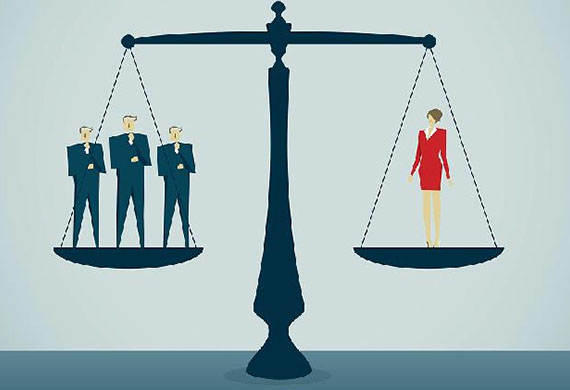
Gender Parity: India Improves, but is Ranked 135th out of 146 Countries, Says Report
By: WE Staff | Wednesday, 13 July 2022
According to the World Economic Forum's (WEF) most recent Gender Gap Report, India's overall position in achieving gender parity improved in 2022, rising five positions to 135 out of the 146 benchmarked this year.
India's gender parity score, which is its seventh-highest in the past 16 years, was 0.629 on a scale where 1 reflects the ideal scenario or "parity," but it still lagged behind its neighbours Bangladesh, Sri Lanka, China, Nepal, the Maldives, and others. In the 2022 edition, Russia was not mentioned by WEF.
The Global Gender Gap Index measures the progress of gender parity across four important parameters (Economic Participation and Opportunity, Educational Attainment, Health and Survival, and Political Empowerment).
Since the indicator was initially created, India's worldwide gender gap score has varied between 0.593 and 0.683, according to WEF. The degree of achievement in India, which has a female population of almost 662 million, has a significant impact on regional rankings. India has made considerable and positive progress in its performance on economic participation and opportunity since 2021, according to the study.
Since 2021, fewer Indian men (down 9.5 percentage points) and women (down 3 percentage points) have joined the labour market. The parity between India and the weighting of the other indicators on the subindex increased for every other indicator, nevertheless.
The survey also reveals that in India, the proportion of female professionals and technical workers went from 29.2 percent to 32.9 percent, and that the proportion of female lawmakers, senior officials, and managers increased from 14.6 percent to 17.6 percent. For estimated earned income, the gender parity score increased.
Values decreased for both men and women, but men had a greater reduction. Health and Survival and Educational Attainment revealed negligible, insignificant changes. The analysis discovered that the decreasing percentage of years that women have held the position of head of state over the previous 50 years resulted in a dropping score (-0.010) for Political Empowerment.
Only one in five of the 146 economies surveyed, according to the research, had been able to close the gender gap by at least 1percent in the previous 12 months. While progress has been made in the last year, it has only resulted in a four-year reduction in the amount of time it will take to achieve gender parity. This improvement only partially makes up for the generational setback that was experienced in 2020–2021 at the beginning of the pandemic.
According to the WEF, the gender gap in health and survival among the 146 countries covered in 2022 has decreased by 95.8 percent, in educational attainment by 94.4 percent, in economic participation and opportunity 60.3 percent, and in political empowerment 22 percent.
Most Viewed
- 1 Women's Health Startup HerMD Closing Doors Amid Industry Challenges
- 2 5 Famous Women in Indian Armed Forces
- 3 Saudi Women No longer Require Male Permission for Clothing Choices, says Prince MbS
- 4 Kolkata Medtech Startup Innovodigm Raises Rs 5.5 Crore Seed Funding Led by IAN Group
- 5 Yamunanagar's Kashish Kalra Honoured after Securing 111th Rank in UPSC Civil Services Exam
- 6 Madurai Appoints Its First Woman Corporation Head
- 7 IAS Vijayalakshmi Bidari Appointed as the new Nagpur Divisional Commissioner
- 8 American Entrepreneur Lucy Guo Overtakes T Swift to become Youngest Female Billionaire
- 9 ICC Women's World Cup 2025 Trophy Showcased at Indore's Holkar Stadium
- 10 Aparna Saxena's Beauty Venture AntiNorm Launches in India
- 11 Vidya Nataraj Co-Founded BlueStone Jewellery & Lifestyle files IPO
- 12 5 Women Freedom Fighters of India
- 13 Dr. G Krishnapriya appointed as CEO for Trichy
- 14 M3M & Sirona Partner to Introduce Menstrual Hygiene Vending Machines in 15 Locations
- 15 Punjab Govt launches SHE Cohort 3.0 Supporting Tech-led Women Startups
- 16 Indian origin Lawyer, Sweena Pannu appointed as the US New Superior Court Judge
- 17 The Aurora Tech Award recognizes 4 Indian Women-led Startups
- 18 Kerala's Republic Day parade featured an all-female tableau
- 19 Manisha Kabbur Becomes Karnataka's First Woman International Karate Coach
- 20 Director K. S. Ravikumar's Daughter Maalica Ravikumar Launches Life Coaching Company 'Evergrowth Academy' for Women
- 21 Leezu's Raises Pre-Seed Funding to Accelerate Growth in Sexual Wellness Industry
- 22 Sattu: Super-easy summer drink for PCOS gut healing
- 23 Swathi Nelabhatla creates Sitha App, India's First Women-Exclusive Gig Platform
- 24 7 Timeless Female Kathak Dancers & their Iconic Legacies
- 25 Meet 7 Iconic Women Architects of Modern India & their Most Impactful Work
- 26 This Woman-led Insuretech Startup is Helping Bridge the Education Financing Gap in India
- 27 Women Leaders Share Lessons Learnt from India Women's WC Win
- 28 5 Enterprising Women Founders Powering Singapore's Tech & Innovation Landscape
- 29 4 Women. 4 Stories. One Vision for Smarter, Stronger Healthcare
- 30 Global Gender Gap Narrows to 68.8%, But Full Equality 123 Years Away: WEF Report 2025
- 31 Changemakers: 7 Women Entrepreneurs Taking the Make in India Movement Forward
- 32 Meet Lucy Guo, The Youngest Self-Made Female Billionaire Disrupting Tech
- 33 How Women are Driving India's Festive Online Shopping Surge






